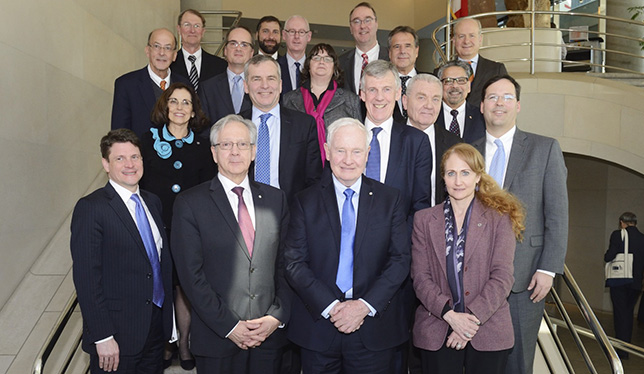Sometimes getting the right people in the room makes all the difference. That was the idea behind a roundtable on Feb. 11 at the Canadian Embassy in Washington. Universities Canada and the Canada Foundation for Innovation co-convened the meeting of research agency leaders from Canada, the U.S. and Europe to talk about ramping up international research collaboration.
The event piggybacked a major scientific draw in the city. The annual meeting of the American Association for the Advancement of Science is in town, attracting thousands of top researchers and research organizations from around the globe.
For two hours, this small group of 20 people talked about barriers, opportunities and ideas around international collaboration in research and innovation, skilfully led by Governor General David Johnston as moderator.

They talked about the big, ambitious and long-term stuff; the kind of collaborative efforts that led to this week’s historic news about gravitational waves. A more Canadian example is the Ebola vaccine. Or Art MacDonald’s Nobel Prize in Physics for SNOlab’s work on neutrinos. The world needs more of this and the people around that table at the embassy are well positioned to help make it happen.
The discussion supported doing more to bring the best minds together to solve the most pressing problems facing the world, but not just in the crucial long-term, visionary way. These research leaders also talked about the need to be more nimble in responding to new and urgent needs that seem to appear out of nowhere. The Zika virus is a perfect example. How do we put the mechanisms in place to make sure we have the resources and systems to mobilize quickly when the world needs a solution now?
The answer won’t come overnight, but it is coming. Around the table yesterday there was a commitment to keep up the conversation and work together to find the solutions.
Hosting this high-level gathering was a smart move for Canada. It’s part of our research-supporting organizations being back at AAAS, but in a different way. At this time a couple of years ago I lamented the demise of the orchestrated Canadian presence at the largest general science gathering in the world. But perhaps we don’t need that huge Canadian pavilion, all the brochures and sponsored events. Perhaps what we really need is to take advantage of gatherings like this to get the right people in the room and make things happen.
Another example of getting the right people in the room is the work of our friends at CFI. This morning they hosted an insightful panel as part of AAAS’s scientific symposia, Arctic Research as a Model for Responsible International Collaboration, moderated by Canada’s new Minister of Science, the Hon. Kirsty Duncan.
ArcticNet’s Louis Fortier of Université Laval introduced the audience to the pride of Canadian Arctic research, the CCGS Amundsen, and talked about the impacts of climate change on the North. Yellowknife’s Erin Freeland Ballantyne of the Dechinta Center for Research and Learning shared the perspective of Arctic people and looked forward to a time when they would lead Arctic Research.
Indeed, you can’t talk about Arctic research without talking about Arctic people – their knowledge, their needs and their land. Martha Crago, vice president research at Dalhousie, was in the audience and reminded us that whenever we talk about science, we must include the social sciences.
CFI also brought American and European perspectives to the panel with speakers Kelly Falkner of the National Science Foundation and Antonio Di Giulio of the European Commission Directorate-General for Research and Innovation.
Di Giulio opened his remarks by thanking the Canadians for bringing along an Arctic air mass, which has been keeping the sidewalks around the convention centre rather empty. He admitted he was having trouble adjusting to the Ottawa-esque temperatures, but thought it a very nice touch for the panel.
To which we offer a very Canadian, “You’re welcome.”
Helen Murphy is director of communications at Universities Canada.